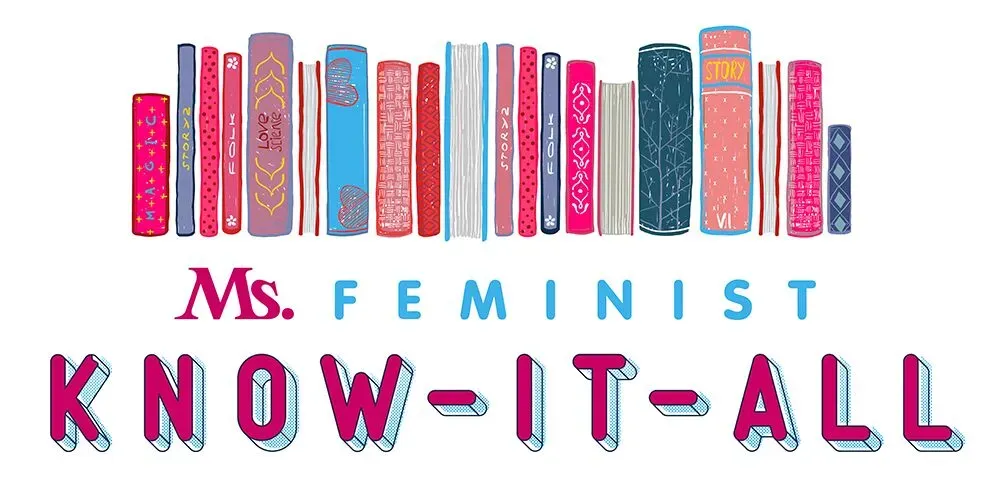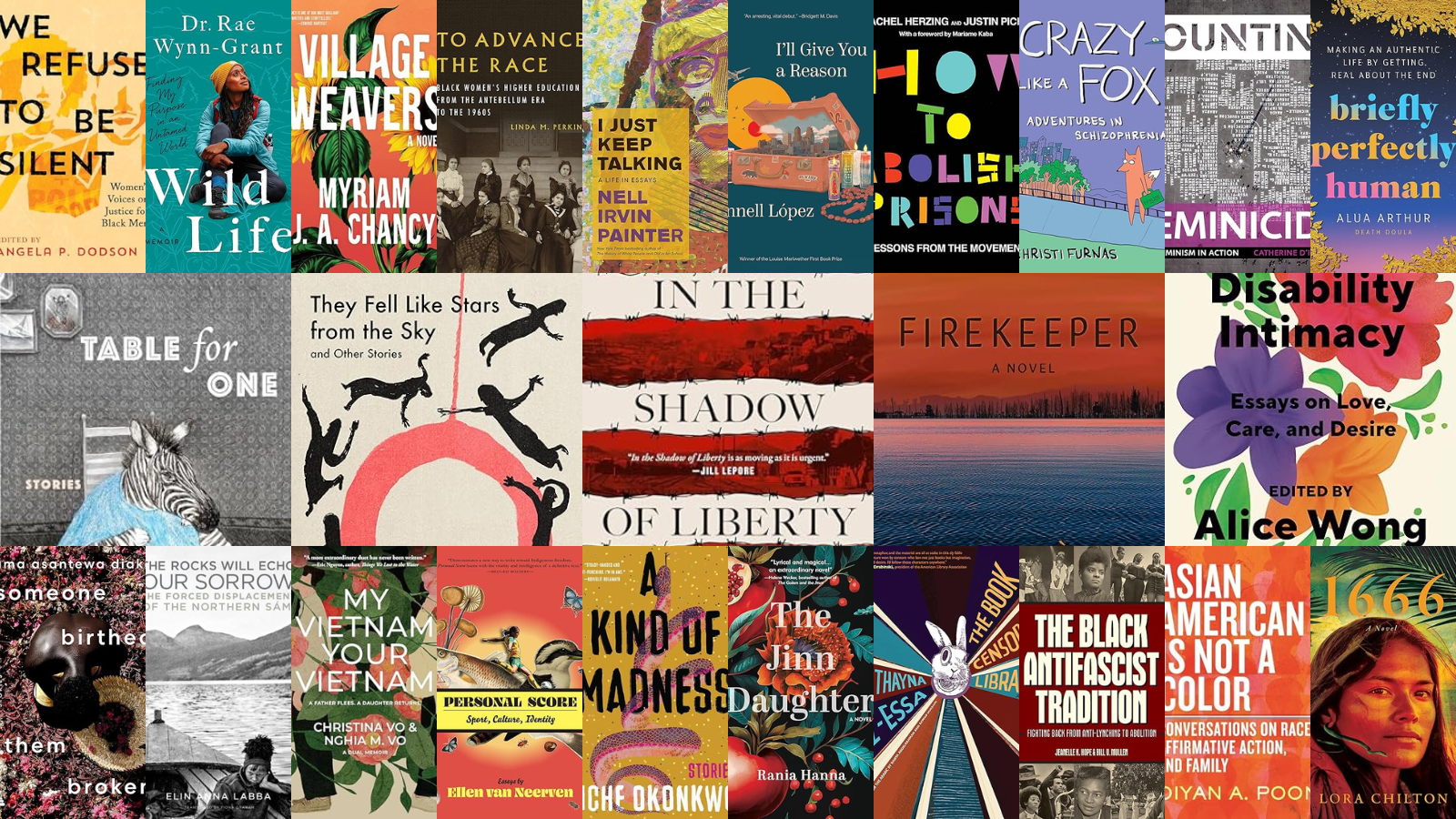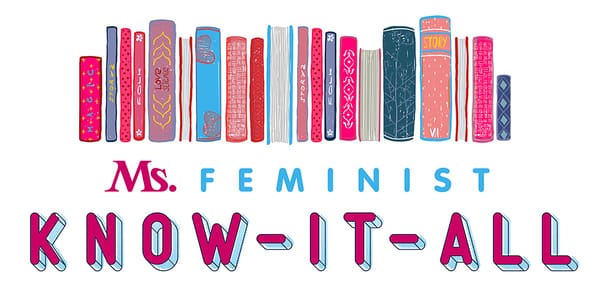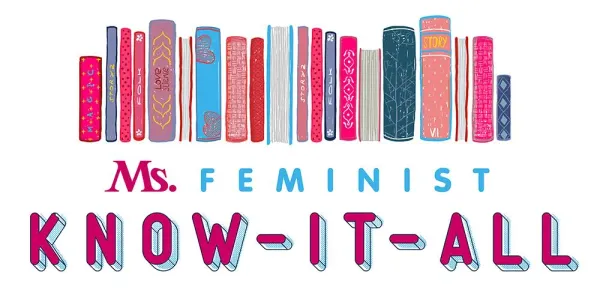April 2024 Reads for the Rest of Us
Here are 25 fantastic books releasing this month that I recommend you dig into.

Originally published 4/1/2024 at Ms. Magazine.
The Feminist Know-It-All: You know her. You can’t stand her. Good thing she’s not here! Instead, this column by gender and women’s studies librarian Karla Strand will amplify stories of the creation, access, use and preservation of knowledge by women and girls around the world; share innovative projects and initiatives that focus on information, literacies, libraries and more; and, of course, talk about all of the books.
Each month, I provide Ms. readers with a list of new books being published by writers from historically excluded groups.
The aims of these lists are threefold:
- I want to do my part in the disruption of what has been the acceptable “norm” in the book world for far too long—white, cis, heterosexual, male;
- I want to amplify indie publishers and amazing works by writers who are women, Black, Indigenous, Latinx, APIA/AAPI, international, queer, trans, nonbinary, disabled, fat, immigrant, Muslim, neurodivergent, sex-positive or of other historically marginalized identities—you know, the rest of us; and
- I want to challenge and encourage you all to buy, borrow and read them!
I know you’re all busy—as am I—so I will keep this intro short. You know what to expect from me by now!
Here are 25 fantastic books releasing this month that I recommend you dig into.
There are stunning debuts, masterful historical fiction, kaleidoscopic short stories, thoughtful manifestas, moving memoirs, groundbreaking nonfiction, and so much more.
Take your picks and let me know what you enjoyed. And be watching for my annual giant Poetry for the Rest of Us column coming soon!

1666: A Novel
By Lora Chilton (Patawomeck) (@lorajchilton). Sibylline Press. 224 pages. Out Apr. 2.
Based on a true story passed down through generations on her father’s side, 1666 is focused on three Patawomeck women who survived a massacre of their tribe, were forced to march south, and sold into slavery. The tribe survives to this day in large part because of the escape and survival of these women.
*
The Black Antifascist Tradition: Fighting Back From Anti-Lynching to Abolition
By Jeanelle K. Hope and Bill V. Mullen. Haymarket Books. 292 pages. Out Apr. 2.
This introduction to the Black anti-fascist tradition is a necessary intervention for our increasingly dangerous and authoritarian times. Drawing on Ida B. Wells, Mary McLeod Bethune, Angela Davis, and more, Hope and Mullen offer an accessible history and strategies for forward movement.
*
The Book Censor’s Library
Written by Bothayna Al-Essa (@bothayna_alessa). Translated by Ranya Abdelrahman and Sawad Hussain (@sawadhussain). Restless Books. 272 pages. Out Apr. 2.
Although written as satire, parts of this book will ring alarmingly true to those following the rash increase in (attempted) book banning across the U.S. Surreal, all-too-real and endlessly readable, this is a book for book lovers.
*
The Jinn Daughter: A Novel
By Rania Hanna (@rania_the_writer). Hoopoe. 274 pages. Out Apr. 2.
Influenced by Middle Eastern mythology, Rania Hanna’s debut is a moving tale of mothers and daughters, magic and mysticism, love and death. The Jinn Daughter offers fresh storytelling, rich characters and food for thought.
*
someone birthed them broken: Stories
By Ama Asantewa Diaka (@asantewawith1a). Amistad. 192 pages. Out Apr. 2.
I included spoken word poet Ama Asantewa Diaka’s brilliant Woman, Eat Me Whole in my 2022 Poetry for the Rest of Us column, and unsurprisingly, she’s able to convey a similarly powerful and lyrical style in this collection of short stories. Candid and interconnected, the stories feature young Ghanaians through joy and pain, despair and repair, hardship and hope.
*
Village Weavers
By Myriam J.A. Chancy (@myriamjachancy). Tin House. 352 pages. Out Apr. 2.
Myriam J.A. Chancy is an award-winning author who draws upon her Haitian heritage to share the country’s history and stories. Evocative and reflective, Village Weavers is focused on friendship, family and the circumstances that can tear us apart—and bring us back together again.
*
Wild Life: Finding My Purpose in an Untamed World
By Dr. Rae Wynn-Grant (@raewynngrant). Get Lifted Books. 288 pages. Out Apr. 2.
Now more than ever, we need to hear (and read) the voices of women of color on the frontlines of science, environmentalism and wildlife ecology. In Rae Wynn-Grant’s debut memoir, we get that, as well as imperative messages of balance, responsibility and relationship.
*
Crazy Like a Fox: Adventures in Schizophrenia
By Christi Furnas (@christifurnas). Street Noise Books. 240 pages. Out Apr. 9.
Based on her own experiences, Christi Furnas’s debut graphic novel tackles a tough subject with humor and simplicity. Through sweet line drawings of animal friends, Furnas helps to alleviate the stigma of a schizophrenia diagnosis, reinforces the validity of being okay (or not), and illustrates the importance of continually “working on it.”
*
How to Abolish Prisons: Lessons from the Movement Against Imprisonment
By Rachel Herzing and Justin Piché (@JustinPicheh). Haymarket Books. 208 pages. Out Apr. 9.
Carcerality and prison abolition are feminist issues. Read about this grassroots movement, its actions and initiatives, and what we can all learn from it through extensive interviews, examples and research.
*
I’ll Give You a Reason: Stories
By Annell López (@annellthebookbabe). The Feminist Press. 208 pages. Out Apr. 9.
This poignant and sharp debut collection of short stories is bound to surprise, move and delight its readers. Based in the Ironbound neighborhood of Newark, the richly drawn portraits in this volume speak to immigrant life, family, friendship, forgiveness and compassion.
*
Personal Score: Sport, Culture, Identity
By Ellen van Neerven (Mununjali Yugambeh/Dutch). Two Dollar Radio. 360 pages. Out Apr. 9.
I loved soccer (football) as a kid and was the only girl on my team for a bunch of years. But you don’t have to love football (soccer) to love this brilliant collection of essays in which Ellen van Neerven masterfully interrogates the sport’s relationship to the land, to First Nations, to tradition, to sexuality and to gender.
*
Table for One: Stories
Written by Ko-eun Yun. Translated by Lizzie Buehler. Columbia University Press. 256 pages. Out Apr. 9.
Ko-eun Yun’s quirky and provocative stories explore modern urban life, solitude, technological advancements, progress, and the future. Surreal and comedic, this story collection mostly terrified me. I loved it.
*
To Advance the Race: Black Women’s Higher Education from the Antebellum Era to the 1960s
By Linda M. Perkins. University of Illinois Press. 408 pages. Out Apr. 9.
In this groundbreaking history examining African American women in higher education, Linda M. Perkins traces Black women as students, teachers, and administrators from pre-Civil War abolitionist colleges into the 20th century for a comprehensive and endlessly readable history of the commitment to education throughout generations.
*
Briefly Perfectly Human: Making an Authentic Life by Getting Real About the End
By Alua Arthur (@going_with_grace). Mariner Books. 272 pages. Out Apr. 16.
As a death doula, Alua Arthur has witnessed many aching for peace in life’s last moments. In her insightful debut memoir, she compassionately shares how reflecting upon our inevitable impending death can breathe new life into each of us.
*
In the Shadow of Liberty: The Invisible History of Immigrant Detention in the United States
By Ana Raquel Minian. Viking. 384 pages. Out Apr. 16.
In this urgent volume, Ana Raquel Minian explores the history of immigrant detention in the U.S. and its effects on individuals and society as a whole. Through expert reportage, Minian illustrates the secrecy inherent in the system, the denial of basic human rights and how concerns for profit lead to tragic – and unnecessary – loss.
*
A Kind of Madness: Stories
By Uche Okonkwo (@UcheAnne). Tin House Books. 224 pages. Out Apr. 16.
Set in Nigeria, this collection explores how relationships, traditions and hardships can drive us to different kinds of madness. Be it mental illness, broken promises or unmet expectations, life’s complexities are the main characters in these striking and insightful stories.
*
My Vietnam, Your Vietnam
By Christina Vo (@stina_vo) and Nghia M. Vo. Three Rooms Press. 320 pages. Out Apr. 16.
While Christina Vo and her father share a common Vietnamese heritage, their experiences of the place and its effect on them are vastly different. This extraordinary dual memoir illustrates the pain of intergenerational trauma, the power of healing and the reality that two divergent perspectives can be true at once.
*
They Fell Like Stars from the Sky & Other Stories
Written by Sheikha Helawy. Translated by Nancy Roberts. Neem Tree Press. 128 pages. Out Apr. 16.
Palestinian-born Sheikha Helawy’s first book to be translated into English is a volume of 18 impassioned yet subtle stories of Bedouin women. From the margins, these women bravely follow their curiosities, challenge taboos and break traditions in their quest for agency and autonomy.
*
Firekeeper: A Novel
By Katłıà (Dene) (@katlia11). Roseway Publishing. 176 pages. Out Apr. 18.
Focused on a troubled Indigenous teen, Katłıà’s fourth book grapples with the legacies of trauma. A story of colonialism, coming of age and community, Katłıà’s tremendous storytelling is not to be missed.
*
I Just Keep Talking: A Life in Essays
By Nell Irvin Painter (@nellpainter). Doubleday. 464 pages. Out Apr. 23.
Critical, artistic and complex, the work of the incomparable Nell Irvin Painter is gathered here into one essential volume. The essays explore history, politics, race, identity, and more and are poignantly punctuated by Painter’s original artwork.
*
The Rocks Will Echo Our Sorrow: The Forced Displacement of the Northern Sámi
Written by Elin Anna Labba (@elin_anna). Translated by Fiona Graham. University of Minnesota Press. 168 pages. Out Apr. 23.
Once nomads who spent winters in Sweden and summers in Norway, the indigenous Sámi people were forcibly removed when Norway became an independent country in 1905. In this groundbreaking volume, the sirdolaččat (the displaced) tell their grim story of bággojohtin (forced displacement) through poetry, letters, lyrics, photos and histories.
*
Asian American Is Not a Color: Conversations on Race, Affirmative Action, and Family
By OiYan A. Poon (@oiyanpoon). Beacon Press. 232 pages. Out Apr. 30.
By exploring the diversity of views, experiences and narratives among Asian Americans, OiYan Poon offers a necessary intervention in the conversations of race and affirmative action. This nuanced examination is both extensively researched and accessibly written.
*
Counting Feminicide: Data Feminism in Action
By Catherine D’Ignazio. MIT Press. 392 pages. Out Apr. 30.
Trust me when I say you do not have to be a data scientist to read this book. Written for all of us, it is a crucial follow-up to Data Feminism (by the author and Lauren Klein), filled with groundbreaking work being done by grassroots collectives and individuals to collect (counter)data that reflects the horrific reality of feminicide across the Americas. In a month of essential releases, it’s this month’s #RequiredReading.
*
Disability Intimacy: Essays on Love, Care, and Desire
Edited by Alice Wong (@disability_visibility). Vintage. 384 pages. Out Apr. 30.
Alice Wong has curated a groundbreaking collection of first-person narratives, poetry, photo essays, and stories on the intersections between disability and intimacy. This essential volume includes pieces by Sarah A. Young Bear-Brown, Mia Mingus, Leah Lakshmi Piepzna-Samarasinha, Moya Bailey, Jaipreet Virdi, Naomi Ortiz and more.
*
We Refuse to Be Silent: Women’s Voices on Justice for Black Men
Edited by Angela P. Dodson. Broadleaf Books. 350 pages. Out Apr. 30.
In this groundbreaking collection of essays, over 35 extraordinary women speak out on the violence, injustice and oppression of Black men across the U.S. The contributors are writers, historians, scholars, journalists, wives, mothers and witnesses, including Darnella Frazier, Isabel Wilkerson, Elizabeth Alexander, Keeanga-Yamahtta Taylor, Michelle Duster, and more.
*




